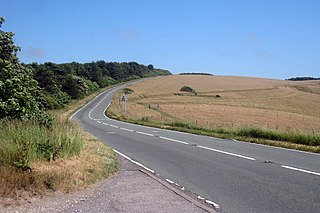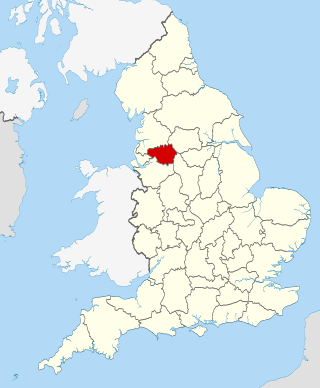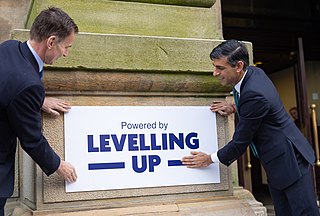Related Research Articles

Thames Gateway is a term applied to an area around the Thames Estuary in the context of discourse around regeneration and further urbanisation. The term was first coined by the UK government and applies to an area of land stretching 70 kilometres (43 mi) east from inner east and south-east London on both sides of the River Thames and the Thames Estuary. It stretches from Westferry in Tower Hamlets to the Isle of Sheppey/Southend-on-Sea and extends across three ceremonial counties.

The A259 is a road on the south coast of England passing through Hampshire, West Sussex, East Sussex, and Kent, and is the longest Zone 2 A road in Great Britain. The main part of the road connects Brighton, Peacehaven, Eastbourne, Hastings, Rye, and Folkestone.

The National Highways Development Project (NHDP) was a project of four laning of existing national highways and six laning of selected major national highways of India. The project was started in 1998 under the leadership of Prime Minister, Atal Bihari Vajpayee. National Highways account for only about 2% of the total length of roads, but carry about 40% of the total traffic across the length and breadth of the country. This project is managed by the National Highways Authority of India (NHAI) under the Ministry of Road, Transport and Highways. The NHDP represents 49,260 km of roads and highways work and construction in order to boost economic development of the country. The government has planned to end the NHDP program in early 2018 and subsume the ongoing projects under a larger Bharatmala project.

The A5 is a major primary route in Northern Ireland. It links the city of Derry in County Londonderry with Aughnacloy, County Tyrone via the towns of Strabane and Omagh. Just south of Aughnacloy is the border with the Republic of Ireland, where the A5 meets the N2 to Dublin. Between them the A5 and N2 are the main road link between County Donegal in the Republic and Dublin.
Eco-towns are a government-sponsored programme of new towns to be built in England, which are intended to achieve exemplary standards of sustainability.

The Tuvalu Trust Fund is an international sovereign wealth fund established to benefit Tuvalu, a small, central Pacific island nation, by providing income to cover shortfalls in the national budget, underpin economic development, and help the nation achieve greater financial autonomy. The Tuvalu Trust Fund was established in 1987 by the United Kingdom, Australia and New Zealand.

The American Recovery and Reinvestment Act of 2009 (ARRA), nicknamed the Recovery Act, was a stimulus package enacted by the 111th U.S. Congress and signed into law by President Barack Obama in February 2009. Developed in response to the Great Recession, the primary objective of this federal statute was to save existing jobs and create new ones as soon as possible. Other objectives were to provide temporary relief programs for those most affected by the recession and invest in infrastructure, education, health, and renewable energy.
The Canadian federal budget for the 2009-2010 fiscal year was presented to the House of Commons of Canada by Finance Minister Jim Flaherty on January 27, 2009. The federal budget included $20 billion in personal income tax cuts as well as major investments in infrastructure.

The Ministry of Road Transport and Highways (MoRTH) is a ministry of the Government of India, that is the apex body for formulation and administration of the rules, regulations and laws relating to road transport, transport research and in also to increase the mobility and efficiency of the road transport system in India. Through its officers of Central Engineering Services (Roads) cadre it is responsible for the development of National Highways of the country.

The Leeds City Region, or informally Greater Leeds, is a local enterprise partnership city region located in West Yorkshire, England. Prior to the West Yorkshire devolution deal, the partnership covered parts of South and North Yorkshire. According to the Office for National Statistics, as of 2017 the city region ranked 2nd behind Greater London for both population and GVA in the United Kingdom. It has a population of 2,320,214 million and a GVA of £69.62 billion.

Rebuilding American Infrastructure with Sustainability and Equity (RAISE) is an American federal government program administered by the United States Department of Transportation. Originally known as Transportation Investment Generating Economic Recovery (TIGER), it began as supplementary discretionary grant program included in the American Recovery and Reinvestment Act of 2009. Initial legislation provided $1.5 billion for a National Surface Transportation System through September 30, 2011, "to be awarded on a competitive basis for capital investments in surface transportation projects". The program has been extended several times, and was renamed as Better Utilizing Investments to Leverage Development (BUILD) in 2018 before taking its current name in 2021.

The Greater Manchester Combined Authority (GMCA) is a combined authority for Greater Manchester, England. It was established on 1 April 2011 and consists of 11 members; 10 indirectly elected members, each a directly elected councillor from one of the ten metropolitan boroughs that comprise Greater Manchester, together with the directly elected Mayor of Greater Manchester. The authority derives most of its powers from the Local Government Act 2000 and Local Democracy, Economic Development and Construction Act 2009, and replaced a range of single-purpose joint boards and quangos to provide a formal administrative authority for Greater Manchester for the first time since the abolition of Greater Manchester County Council in 1986.

The Localism Act 2011 is an Act of Parliament that changes the powers of local government in England. The aim of the act is to facilitate the devolution of decision-making powers from central government control to individuals and communities. The measures affected by the Act include an increase in the number of elected mayors, referendums and the "Local authority’s general power of competence" which states "A local authority has power to do anything that individuals generally may do".

Transport for NSW (TfNSW) is a New South Wales Government transport services and roads agency established on 1 November 2011. The agency is a different entity to the NSW Department of Transport, which is a department of the state government of New South Wales, and the ultimate parent entity of Transport for NSW.

The Mayor of Greater Manchester is the directly elected mayor of Greater Manchester, responsible for strategic governance in the region that includes health, transport, housing, strategic planning, waste management, policing, the Greater Manchester Fire and Rescue Service and skills. The creation of the Mayor of Greater Manchester was agreed between the then Chancellor of the Exchequer, George Osborne, and Greater Manchester's 10 district council leaders. As well as having specific powers, the mayor chairs the Greater Manchester Combined Authority, also assuming the powers of the Greater Manchester Police and Crime Commissioner.

Ude Desh ka Aam Naagrik, known by its acronym UDAN-RCS is a regional airport development program of the Government of India and part of the Regional Connectivity Scheme (RCS) of upgrading under-serviced air routes.RCS scheme consists of setting up Greenfield airports and as well as upgradation of Brownfield airports. Its goal is to make air travel affordable and improve economic development in India. At the beginning of the scheme, out of a total of 486 airports, 406 were under-serviced and only 27 were well-served; out of 97 non-RCS airports only 12 were operational. The UDAN scheme was created to add to this number by expediting the development and operationalization of India's potential target of nearly 425 unserved, under-served, and mostly underdeveloped regional airports with regularly scheduled flights. However, several issues and criticisms of its poor infrastructure, dominance by larger airlines, degradation of regional airlines, and slow implementation have plagued the scheme. In October 2023, India has 149 operational airports for civil aviation, including 30 international, 12 customs, 107 domestic, and few more civil aviation enclaves within military air bases. India is also planning to build the second airports in the big cities to decongest, 6 by 2030, 15 by 2040 and 30 plus by 2047.

Indigenous Services Canada is one of two departments in the Government of Canada with responsibility for policies relating to Indigenous peoples in Canada. ISC's mandate is to work "collaboratively with partners to improve access to high quality services for First Nations, Inuit and Métis."

Budget 2020, dubbed "Rebuilding Together", was the New Zealand budget for fiscal year 2020/21 worth NZ$50 billion, presented to the House of Representatives by Finance Minister Grant Robertson on 14 May 2020, the third budget presented by the coalition government of 2017–2020. This budget occurred during the COVID-19 pandemic in New Zealand and on the same day that the country exited the lockdown brought about by alert level 3.

The Infrastructure Investment and Jobs Act (IIJA), also known as the Bipartisan Infrastructure Law (BIL), is a United States federal statute enacted by the 117th United States Congress and signed into law by President Joe Biden on November 15, 2021. It was originally introduced in the House as the INVEST in America Act and the Bipartisan Infrastructure Bill before it was signed into law.

"Levelling up" is a political policy first articulated in the 2019 Conservative Party manifesto that aims to reduce the imbalances, primarily economic, between areas and social groups across the United Kingdom. It seeks to do so without acting to the detriment of prosperous areas, such as much of South East England. A white paper for the policy was published by Boris Johnson's government on 2 February 2022, and was continued by Rishi Sunak's government. The policy was overseen by the Department for Levelling Up, Housing and Communities.
References
- ↑ "Community Infrastructure Fund, written answers and statements". 27 March 2009. Retrieved 25 November 2009.
- ↑ "Community Infrastructure Fund Round 2". Department for Transport. Archived from the original on 22 November 2010. Retrieved 25 November 2009.